Livelihood and Ministry
 I did not know him well, but after being a peer in seminary classes I knew enough of his story to be intrigued. He came to the city from a rural area. He was a farmer before attending seminary. He would return to his farm afterward to continue plowing, seeding, and harvesting.
I did not know him well, but after being a peer in seminary classes I knew enough of his story to be intrigued. He came to the city from a rural area. He was a farmer before attending seminary. He would return to his farm afterward to continue plowing, seeding, and harvesting.
The process that brought him to seminary is what interested me the most. His rural congregation recognized they would never be able to fully support an associate pastor with responsibility for the discipleship ministries of the church. Their strong desire for good leadership in that ministry area prompted the leaders to select him as the one from among them who would complete a master’s degree in Christian education. The congregation assisted with tuition and took on some of the chores while he was in the city. For this man, a seminary education was not intended to change the source of his livelihood but to make him better able to equip the congregation for the work of ministry.
Rabbinic Tradition
In some ways, this story parallels that of the rabbi in Jesus’ time. A rabbi would work at a trade in the mornings and study the Torah in the afternoons. An apprentice would learn the rabbi’s trade as well as benefit from the instruction in the Hebrew scriptures, so student and teacher would spend all day together.
The Apostle Paul followed this pattern of livelihood and ministry. He reminded the church in Thessalonica that he and those who traveled with him “worked night and day, so that we might not burden any of you” (1 Thess. 2:9). He acknowledged to the Corinthians that he and his companions grew weary from the “work of our own hands” (1 Cor. 4:12).
In Acts 20, we read about Paul’s call for the leaders of the church in Ephesus to visit him in Miletus. These elders were those in the church with seasoned judgment who had been called by the Holy Spirit to lead this congregation. Paul confirmed God’s direction that they serve the church as “overseers” with the primary responsibility of providing care for the Christians like a shepherd cares for a flock of sheep (Acts 20:28).
Paul then reminded them that he followed the rabbinic tradition: “You know for yourselves that I worked with my own hands to support myself and my companions. In all this I have given you an example that by such work we must support the weak” (Acts 20:34–35). Paul’s admonition went beyond basic personal support in its call that “we” (Paul and the Ephesian elders) work so as to be able to provide for those too weak to work. Their livelihood provided the means by which they could share with those in need, an act that Paul said was a form of “remembering the words of the Lord Jesus.” When Paul and these elders engaged in their professions and shared with others, they became an embodiment of Jesus’ call that His followers love as they had been loved by God.
The Self-sufficient Pastor
Rodney Clapp, in his book A Peculiar People: The Church as Culture in a Post-Christian Society (IVP, 1996), suggests that “we Christians find ourselves in a situation much more closely analogous to that of New Testament Christians” than at any time between then and now (p. 77). Clapp’s interest is in other aspects of being the church, but I am beginning to wonder if this observation is also true for the economics of congregational and pastoral ministry.
I recently interacted with three seminary students who have a financial self-sufficiency that reduces reliance on the church for support.
One student is a 20-something who was advised to become established in a profession before attending seminary. Even though congregational ministry was his primary vocational goal, his undergraduate study and subsequent work experience ultimately provided certification as an accountant. He is employed by a firm that allows him to work remotely, so he can generate the income his family needs from any location.
Another student qualified for retirement after 27 years in the military. That steady income stream provides basic financial support that minimizes the need to seek a highly compensated ministry assignment.
Still another student has a spouse whose job provides adequate household resources. The husband sees himself as contributing to the work of ministry in that his income frees his wife to go wherever God calls.
In all three of these cases, when these students graduate from seminary they will have a great deal of financial flexibility as they serve God through the church.
We cannot at this point clearly identify whether these three students illustrate a “new normal,” or if they represent an anomaly. We need careful observation over time to be able to definitively assess the shifting circumstances. But I wonder: could it be that in our day we need to once again consider Paul’s example of livelihood and ministry? Maybe the rhythms of an ancient rabbinic tradition can provide guidance as we move forward.

